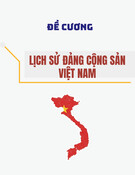
VĂN HÓA TRUYỀN THỐNG VÀ PHÁT TRIỂN
108 April, 2025
CLAN CULTURE WITH LOCAL GOVERNANCE,
CASE RESEARCH OF DA NANG CITY
Tang Chanh Tin
Local governance is not a new issue in the world, but in Vietnam, the term of local governance
has only been mentioned and studied in depth in the past few years. Local governance can be
understood as a set of entities that have the ability to impact, control and influence economic, cultural,
social development, political and security situations, as well as the planning, promulgation of policies and
planning at the local level. Vietnam - with the characteristics of a country with a long-standing agricultural
tradition, local governance cannot be separated from cultural entities that have existed for a long time and
have strong influence in localities, especially rural areas. Among them, the issue of clan and clan culture is
one of the important factors affecting local governance. Through the case of Da Nang city, this article will
focus on clarifying the role of clan culture in local governance in this city.
Keywords: Clan; Family culture; Role; Local governance; Da Nang City.
University of Science and Education, The University of Da Nang
Email: tctin@ued.udn.vn
Received: 21/01/2025; Reviewed: 12/02/2025; Revised: 17/02/2025; Accepted: 25/3/2025; Released: 28/4/2025
DOI: https://doi.org/10.54163/ncdt/438
1. Introduction
Governance in general and local governance
in particular were born in association with the
emergence and development of the State, from
the primitive to the modern level. In which, local
governance is one of the three main levels of
governance activities, including global governance,
national governance and local governance. Along
with the development of human social history,
the role and position of local governance are
increasingly affirmed and promoted; associated
with the interests of local communities, ensuring
stable and sustainable development. However,
with many different approaches, the issue of local
governance also has inconsistent understandings
and applications, “Local governance is a concept
that only exists in doctrines and does not have an
official connotation in international documents or
in the Constitutions and laws of countries” (Ngoc,
2014, p.34).
It would be a mistake to understand local
governance as only including the legal system,
policies and governance methods of the local public
authority system. Because governance at the local
level cannot be separated from local institutions,
which are cultural products of the community,
it is formed, existed and maintained over many
years. Therefore, it can be understood that local
governance is a part of national governance,
including a system of general regulations of
the State and specific regulations of the locality
(conventions, village regulations, customs) to
maintain all social activities, ensuring political
and social stability, social order and safety, people
have the right to express their wishes and interests
when the local government cannot meet them.
In some European countries with experience in
local governance, such as the United States, the
United Kingdom, Germany..., the importance of
regulations and institutions specific to each locality
in governance is recognized.
With the characteristics of a long-standing
agricultural society in Southeast Asia, local
governance in Vietnam has the outstanding feature
of being inseparable from informal governance
institutions, especially local governance in
rural areas. Autonomy is one of the important
characteristics of Vietnamese village culture, “each
village is an autonomous organization within
the country” (Anh, 2014, p.116). According to
the results of the 2019 Population and Housing
Census in Vietnam, the number of people living
in rural areas of our country is 63,086,436 people,
accounting for nearly 65.6%, more than 1/3 of the
population are farmers (Vietnam.unfpa, 2019).
One of the important factors in the informal
governance system affecting local governance
in Vietnam is the issue of clans and clan culture.
Along with the ups and downs of Vietnamese
history and society over the past centuries, clans
and clan culture have always accompanied and had
significant influences. In local governance, from

VĂN HÓA TRUYỀN THỐNG VÀ PHÁT TRIỂN
109Volume 14, Issue 2
the monarchical period to the present, clans still
have an important and multi-dimensional influence.
With a specific survey in Da Nang city, a locality
located in the middle of the country with many
unique features in clan culture, we will clarify the
role of clan culture in local governance here from a
multidimensional, dialectical perspective.
2. Research overview
Research on state governance in general and
local governance in particular has been of interest
to scholars and researchers around the world
quite early. Since the 1960s, many researchs have
appeared related to the decentralization process in
many countries around the world, with research
affirming and promoting the role of people in local
governance.
Local governance according to the above
approach plays a role in guiding the socio-
economic development process of the locality
through determining strategic vision, developing
planning and development plans, directly managing
local affairs, exploiting and effectively using
local resources; organizing law enforcement,
implementing decisions of the central government
in the locality, reflecting the aspirations and interests
of the people and creating conditions for local
people to have more opportunities to participate
in state work; caring for the material and spiritual
life of local people, implementing social justice and
equality in the locality.
In 1985, the European Union adopted the
Convention on Local Self-Government, which
requires countries wishing to join the European
Union to join the Convention. The European Charter
on Local Self-Government, which came into effect
on September 1st, 1988, has been ratified by over 30
European countries and to be used by Central and
Eastern European countries as a guideline on local
government in the development of constitutions
and related legal documents. Local autonomy is
understood as the real right and ability of local self-
governing bodies to decide and manage a large part
of social affairs, within the legal framework and
to be responsible for serving the interests of local
residents (Duc, 2007).
In Vietnam, in recent years, with the urgent need
to innovate local governance to suit the requirements
of national construction and development in the
new situation, many researchers have published
works on local governance, such as: International
experience in local self-government and the
possibility of application in Vietnam (Cuong, 2016);
Local development management (Nhue, Thu., &
Cuc, 2015); Local self-government regime in the
world and the issue of application in the innovation
of local government organization in Vietnam (Tri,
2020),… In addition, there are also a number of
articles published by authors in specialized journals
that also deeply address local governance, such as:
research by authors Pham Hong Tung, Vu Cong
Giao, Cam Thi Lai, Nguyen Van Thoi, Nguyen Thi
Phuong, Dao Thi Thanh Thuy, Nguyen Vu Hoang,
Nguyen Hai Hoang Duc,...
The authors’ research has affirmed the
importance of local governance in local
construction and development; policy planning
and implementation as well as the importance of
local communities among the subjects participating
in local governance. These are valuable scientific
researchs for the author to inherit, supplement and
complete the research content “Clan culture with
local governance - Case research in Da Nang city”.
3. Research method
On the basis of inheriting the research results
of previous authors, in order to clarify the research
problem, we apply a combination of many different
methods, on the basis of interdisciplinary and
regional approaches to be able to identify the
research object comprehensively and objectively.
Methods of collecting, synthesizing and analyzing
documents are used to search for sources of
documents about the research subject. On that basis,
analyzing, screening and compiling data sources
to identify and clarify the role of clan culture in
local governance through the case of Da Nang
city. In addition, this research also uses methods of
comparison, contrast, fieldwork and field surveys...
4. Research result
4.1. Clan culture in Da Nang: Theory and
practice
For every Vietnamese person, the family lineage
and family culture are important and closely related
issues. Because, from the moment of birth, each
person lives, to be nurtured and matures in the
environment of the family community. The family
lineage and clan have become the most noble and
sacred things that Vietnamese people remember.
According to scholar Dao Duy Anh, “Clan
is family, relatives, species” (Anh, 2009, p.603).
With the characteristics of a society following the
patriarchal model, it can be understood that “clan
or lineage gathers all the paternal descendants of
the same recognized ancestor” (Philippe & Oliver,
2002, p.343). Family is not simply a matter of blood
but also binds people together by moral foundation
as well as many other factors. “Vietnamese people,
regardless of their circumstances, also belong to
a clan, that is, a family in the broad sense, firmly
organized, closely linked by blood, by material

VĂN HÓA TRUYỀN THỐNG VÀ PHÁT TRIỂN
110 April, 2025
interests, by religious beliefs and by the moral bonds
of the community” (Leopol, 2006, pp.241-242).
From the family comes the family culture. It
is an inseparable part of national culture. Clan
culture can be understood as “the living and
spiritual activities of a clan, the center of which
is ancestor worship, including three categories,
with material and tangible values and spiritual
and intangible values created and accumulated
by the clan community through the process of
practical activities” (Le, 2018, p.24). It can be seen
that clan culture is a characteristic of Vietnamese
culture, originating from village communities that
are based on agricultural economy. Since ancient
times, clan culture has been the connection between
individuals, between families in a clan, between
generations in the same family..., where order and
family traditions are always respected, the spirit of
solidarity, attachment, respect for elders, neighborly
relations... are always cherished and preserved
by everyone. Broadly speaking, clan culture is an
important foundation of traditional Vietnamese
society and an important factor influencing local
governance in the past and present. It is a cultural
entity containing all the material, mental and
spiritual cultural values produced by families
during the process of formation and development.
Those values are expressed in multidimensional
relationships: between the clan and the village, the
region and the nation; between the clan and the
family and individuals belonging to the clan and
other clans. Da Nang City is currently located in
the cultural space of Quang Nam, a land with a
long history and has witnessed profound cultural
exchanges and acculturation between Vietnamese
culture, Cham culture, Chinese culture, Japanese
culture and Western culture. Therefore, choosing
Da Nang as the location to survey the role of clan
culture is completely reasonable, because the
history of this land is closely linked to the migration
and settlement of Vietnamese people to the
South, placed in the relationship of exchange and
acculturation with indigenous peoples, typically the
Cham people.
Most of the clans in Da Nang originated from
the North (mostly Thanh Hoa, Nghe An, Ha Tinh)
migrating to the South after the event of 1471
under King Le Thanh Tong, followed by the event
of Nguyen Hoang guarding Thuan - Quang land
in 1558. Many clans became the Predecessors and
Postdecessors who established villages in Da Nang.
There are also some families that have indigenous
origins, living together with the Vietnamese for a
long time but still maintain their identity (Ong, Tra,
Che families...). Besides, there are some Chinese
families who migrated here from the 17th-18th
centuries. Choosing Da Nang as a research area will
contribute to clarifying the role of family culture
in the history of building and developing the city,
especially in local governance here.
4.2. Clan culture and local governance
* Cultural aspects
One of the important aspects of local governance
is cultural governance. With the approach towards
building a culture with identity and in line with
sustainable development trends, it can be seen that
clan culture plays an important role in building
a harmonious cultural environment, respecting
traditional values, as well as effectively implementing
cultural policies at the grassroots level, especially
policies on promoting learning and talent.
For Vietnamese people, “A drop of blood is
thicker than water”, the relationship of family
and bloodline is the source that binds all members
together. In Da Nang, today, most families still
live together in the same space. Therefore, besides
the relationship of lineage and blood, people also
treat each other with the relationship of village and
neighborly affection. Maintaining the relationship
within the lineage will contribute to maintaining
the stability and cohesion in the relationship in the
locality. From there, the State’s campaigns, policies
and guidelines will quickly come into practice.
The clan will play an important role alongside the
local government in mobilizing descendants to
comply with all policies and guidelines. The role
of clan culture in local governance in the cultural
aspect in Da Nang has been affirmed through clan
conventions and regulations.
The clan covenant of the Tran Viet clan in Khue
Trung village (Cam Le district) clearly states: “All
clan members must participate in studying and
understanding state laws, live and work according
to the constitution and laws. Implement well the
Party’s guidelines, policies and the State’s laws,
regulations of the local government and fulfill their
civic duties to the country” (Clan Covenant).
Practice in Da Nang shows that clan culture
has played an important role in the movement “All
people unite to build a cultural life in residential
areas”, cleverly integrating this content into clan
activities and including it in clan rules for families
to seriously implement. “All descendants in the
family must always uphold the spirit of solidarity,
promoting traditions, selecting and inheriting the
good customs and rituals left by their ancestors
and grandparents. Research and promote the good
things of other ethnic groups and in society to
enrich the activities of their own family, together

VĂN HÓA TRUYỀN THỐNG VÀ PHÁT TRIỂN
111Volume 14, Issue 2
build a cultural family, a cultural residential area
and a cultural clan” (Clan Rules).
Also through the clans, the traditional beauty
of clan culture in Da Nang is preserved. The
tradition of solidarity and mutual support stands
out. Valuable artifacts and relics associated with
clan culture such as genealogies, ancestral tombs
and communal houses are protected, preserved
and honored. Along with that, local governance in
the cultural aspect has a great contribution of clan
culture in promoting education, cultivating ethics
and personality, contributing to nurturing talents
from clans. This is also an important educational
function of the clan, along with the family, school
and society. From a very early age, clans in Da
Nang have been aware of investing in the education
of their children and grandchildren, because only
education and knowledge can help the family and
clan develop and keep up with the times.
Da Nang City is one of the leading localities
in the country in building models of learning
families and learning clans. Since 2014, the city
has implemented the project “Promoting lifelong
learning movements in families, clans, and
communities”. In order to implement the project,
each residential group and village will select at least
2 typical clans for pilot implementation. By 2023,
the number of clans recognized as learning workers
in the city will reach over 70%. Many clans have
a tradition of building a movement to encourage
learning, such as: Ngo clan - Thanh Khe Tay ward,
Thanh Khe district, Le Tan Thai clan - Man Thai
ward, Son Tra district, Nguyen Huu clan - Hoa An
ward, Cam Le district... The development of these
studious families has had an impact on promoting
the learning promotion movement of localities in
particular and the whole city in general, towards the
goal of building a learning society and a lifelong
learning movement.
Once again, the strength of clan culture in Da
Nang is affirmed, contributing to the successful
implementation of the proposed cultural development
goals, at the same time demonstrating the important
role of clan culture in local cultural management.
* Socio-economic aspects
The power of clan culture not only influences
history and culture but also plays an important
role in the socio-economic development of each
locality. It can be seen that clan culture has shown
its influence on local governance in terms of socio-
economic aspects. Clan culture is a solid foundation
for developing the family economy with the mutual
support and assistance of clan members. It is also a
factor in maintaining social stability in the locality.
Clan culture in Da Nang is a solid foundation for
economic development, especially the household
economy that has existed for a long time. Before
urbanization, most of Da Nang residents lived
on agriculture. The nature of agriculture always
emphasizes community support. Farm work
requires the cooperation of many people. Besides
neighbors, relatives are an important force in
production. Clans in Da Nang all have measures to
help their relatives in agricultural production, such
as: exchanging labor, working together, supporting
each other when plowing and harvesting.
In areas where flooding often occurs during the
rainy season, the family members always support
and help each other overcome difficulties. Besides
the main occupation of rice farming, many families
also have traditional occupations such as flower
growing (Le family in Liem Lac village, Cam
Le) and fish sauce making (Mai family in Nam O
village, Lien Chieu). Their experiences and secrets
in production are passed down from generation to
generation.
In the context of integration and development
of the current market economy, clans in Da Nang
have now established a “Clan Fund” to support
descendants in the clan to borrow capital to do
business. Families in difficulty or in need of capital
for business can ask their clan to borrow money for
a certain period of time. Of course, this loan amount
is interest-free. When repaying, the borrower will
contribute more to the fund when they have made
a profit with the desire to show gratitude to their
family and help those in need like themselves.
This practice has demonstrated the important role
of clan culture in ensuring economic development
and social stability; it is the basic and important
foundation for local governance.
* Political aspect
The clans in Da Nang have made important
contributions to the process of reclaiming land and
establishing villages. This is the first foundation
for the process of building and developing this
land later. The clans have made great contributions
in reclaiming land, establishing villages and
developing the economy in a land that is still wild
and harsh. The ancestors of many clans have become
the ancestors and descendants of many villages,
they are respectfully worshiped by villagers in the
village communal house, have solemn tombs built
and incense is burned all year round.
Throughout history, in the past as well as in the
present, clan culture in Da Nang has had a significant
influence on the local political environment. Over
the periods, clans have made many contributions

VĂN HÓA TRUYỀN THỐNG VÀ PHÁT TRIỂN
112 April, 2025
to building the government system, preserving
and ensuring a stable and safe environment in the
locality. Through clan rules, family traditions, and
clan regulations, descendants strictly abide by the
law, do business honestly and contribute to society.
That is a solid foundation for local governance,
leading to a peaceful and progressive life.
Clan culture, in addition to its positive impacts
on local governance, still has many limitations
stemming from various causes. Although the
importance of clan culture in local governance
is affirmed, clan culture cannot replace state
management. This has been stated by many
researchers: “If active, informal institutions will
contribute to strengthening and improving the
quality and effectiveness of local governance. On
the contrary, outdated and backward customs,
bureaucracy, authoritarianism, bribery, group
interests, favoritism, and bias towards relatives
in the allocation of public resources, recruitment,
promotion, etc. are barriers and obstacles to local
governance” (Thoi, 2023).
When surveying clan culture in Da Nang, we still
see negative issues stemming from the limitations
of backward feudal ideology and jealousy and envy
between clans. Ideas such as “male superiority
and female inferiority” still weigh heavily on the
thoughts and actions of a significant number of
families. Although society is increasingly civilized
and progressive, the struggle for gender equality is
continuous, and society has a more objective view
of gender, clan culture is still an area where gender
equality has not yet achieved its set goals.
The issue of having a son to continue the family
line becomes a burden for young couples and their
families, especially those of the first generation,
the only male descendants in the family. This gives
rise to violations of the population law, those who
do not have a son try to have a son to continue
the family line, putting great pressure on society,
causing many difficulties for local administration.
Along with that, placing too much importance
on emotions, kinship and family relationships also
causes many negative consequences in bringing
the law into life, ensuring fairness, objectivity and
democracy in all activities. In addition, factionalism
and clan ideology are also an obstacle to local
governance because large clans, which make up
the majority of the local population, often hold
important positions in the government apparatus;
clan members with positions often seek to put
their descendants in as many agencies as possible,
even though their professional qualifications
are not guaranteed. This leads to jealousy, envy,
factionalism and competition for influence.
5. Discussion
The clan culture in Da Nang has a long history
of formation and development; it is constantly
preserved and enriched by generations of Da Nang
people. This is a prominent advantage of the clan
culture in Da Nang. The central location of the
country as well as the role of witness to many
historical events have made Da Nang a place for
many clans to settle down. Over hundreds of years,
the clans have built and glorified the good values of
clan culture on this land.
Those good traditions can be mentioned as: love,
share, support each other, help each other overcome
difficulties and hardships. Always being united
and attached creating a great community strength.
Always consciously preserve and maintain the
ancient traditions and customs in the relationships
and interactions with each other in life. All of these
create the strength of the family culture in the
confrontation with many foreign cultural factors.
From the practice of Da Nang city, the role of clan
culture in local governance is affirmed. Clan culture
has made an important contribution to creating a
stable and developing political, economic, cultural
and social environment in localities. Creating a
solid nucleus for implementing local policies.
The roles of clan culture, such as: mobilizing
descendants to build a new cultural life, building
and developing the economy, maintaining social
security and order, promoting education and talent
promotion... have had a positive impact on local
governance. It can be seen that clan culture has truly
become a solid foundation for local authorities and
related sectors in bringing policies to the grassroots,
maintaining stability and development in each
community. Proper recognition of the role of clan
culture in local governance needs to be given due
attention in order to have appropriate solutions to
promote advantages and limit negative impacts.
6. Conclusion
It is necessary to affirm and promote the role
of the local community, in which the clan is an
important entity for local governance. Above
all, clan culture is the subject that exists and has
influences on local aspects from a very early age.
Knowing how to promote the role of clan culture
will contribute to promoting success in local
governance. Respect and listen to the opinions
and wishes of the clan in planning, building and
implementing local policies. Besides, it is necessary
to boldly point out the limitations of clan culture in
local governance and have solutions to overcome
them; so that clan culture can truly become an
important informal institution that promotes and
improves the effectiveness of local governance.





![Chính sách tiếp quản giáo dục Đại học ở miền Nam Việt Nam sau 1975: Từ chỉ đạo đến thực thi [Phân tích chi tiết]](https://cdn.tailieu.vn/images/document/thumbnail/2025/20250804/kimphuong1001/135x160/4571754299722.jpg)














![Giáo trình Tổ chức và Quản lý Hoạt động Văn hóa Thông tin Cơ sở (Ngành Quản lý Văn hóa - Trung cấp) - Trường Trung cấp Mỹ thuật - Văn hóa Bình Dương [Mới nhất]](https://cdn.tailieu.vn/images/document/thumbnail/2025/20251110/kimphuong1001/135x160/17861762748492.jpg)





